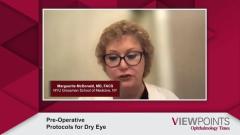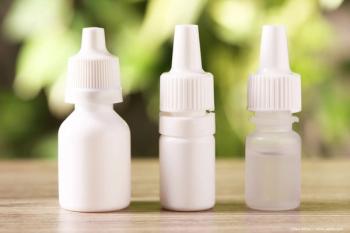
Pre-Operative Protocols for Dry Eye
Ophthalmologists offer their clinical insights and best practices of procedural therapies for dry eye management prior to surgery.
Episodes in this series

Transcript
Marguerite McDonald, MD, FACS: These in-office procedures become very popular. How do they fit into your regimen before surgery, if at all?
Peter McDonnell, MD: With meibomian gland disease, I’ve had some people [ask what the difference is] between a corneal specialist and a comprehensive ophthalmologist. The corneal specialist will carefully look at the eyelids and flip the lids before they do anything else. Meibomian gland disease can be very underappreciated clinically because we’re focused on something else. And treatments like LipiFlow can really make a difference. Again, I have no financial interest with that company, but [it] can really help the patients. When the patients see improvement from that treatment beforehand and know you’ve done what you can to tune-up their surface, they appreciate it. So yes, we offer these when we think it’s appropriate, and we see patients [who] have responded very nicely to those treatments.
Marguerite McDonald, MD, FACS: We’re blessed with some new agents that do start to take effect very quickly, but most of our [patients with] cataract are boomers now. The greatest generation, sadly, is almost gone. Boomers are very busy people. Half of them have retired, but even [those who] are retired [have] a deadline. They want cataract surgery before they go skiing in Aspen, [Colorado], this winter. Or they have a deadline before their daughter’s wedding. So the faster we can get them tuned up—if you explain it that way, [that] “This in-office procedure, along with the other agents I’ve prescribed for you, will get you into tip-top shape so your preop measurements will be accurate and you’ll be happy with your surgery.” And we do a lot of the in-office procedures.
Karl Stonecipher, MD: You used to give lectures on this for years, and it’s a profitable thing. As doctors, we’re going to do their cataract surgery, but at the same time, free gets a little hard after a while. For me, we’re doing low-level light therapy, IPL, LipiFlow, we’re using the LipiView daily just to show them the disease process…. We’re using Blink Energy [and] radiofrequency. So, it depends on what the original disease process is, but you also have to work within the patient’s budget. With premium [intraocular lenses], you’re talking about 50-second lasers and torque lenses. You have to have a conversation with the patient: “This is what I think you need, and this is what I [would] do if you [were my family].” But one of the simplest things we’ve done lately—it’s $19.99 to $22, you can buy it online—they’re the heated dry eye masks. I’ve got no affiliations with any of these masks. The one we use primarily is called Aroma Season, but there’s Dr Prepare and some others…. They work exceptionally well for the evaporative patient. So if I can give the patient an insurance-based treatment, like I’m going to put them on a drop that may be covered…or one of the newer agents, like Miebo [or] Xdemvy, or whatever you want to say, they at least know that I’ve exhausted their insurance options. That’s when I start looking at it and saying, “Hey, look, we tried everything the insurance is going to cover. Let’s talk about low-level light therapy.” That’s kind of our introductory thing—or level-level light therapy plus IPL, or radiofrequency, or lip review, and some of these other things.
Transcript was AI-generated and edited for clarity.
Newsletter
Don’t miss out—get Ophthalmology Times updates on the latest clinical advancements and expert interviews, straight to your inbox.




































